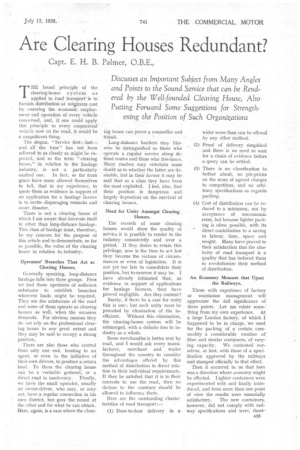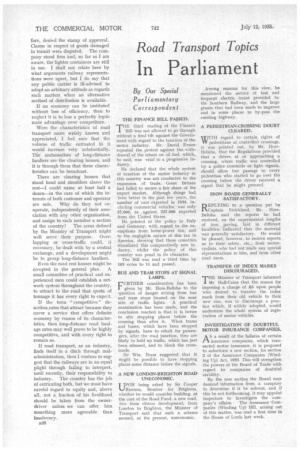Are Clearing Houses Redundant?
Page 39

Page 40

If you've noticed an error in this article please click here to report it so we can fix it.
Discusses an Important Subject from Many Angles and Points to the Sound Service that can be Rendered by the Well-founded Clearing House, Also Putting Forward Some Suggestions for Strength
ening the Position of Such Organizations Capt. E. H. B. Palmer, 0.B.E.,
THE broad principle of the clearing-house system as applied to road transport is to furnish distribution at mi* num cost by ensuring the econoink employment and operation of every vehicle concerned, and, if one could apply this principle to every commercial vehicle now on the road, it would be
a magnificent thing. .
The slogan, "Service first—last---and all the time " has . not been adhered to as closely as might be expected, and so the term "clearing house," in relation to the haulage industry, is not a particularly exalted one. In fact, so far from grace have some allowed themselves to fall, that in my experience, to quote them as evidence in support of an application for a haulage licence is to invite disparaging remarks and court disaster.
There is not a clearing house of which I am aware that interests itself in other than long-distance haulage. This class of haulage must, therefore, be my concern for the purpose of this article and to demonstrate, so far as possible, the value of the clearing house in relation to. industry.
Operators' Branches That Act as Clearing Houses.
Generally speaking, long-distance haulage falls into three groups. First we find those operators of sufficient substance to establish branches wherever loads might be required. They are the aristocrats of the road and some of them operate as clearing houses as well, when the occasion demands. For obvious reasons they do not rely on the professional clearing house to any great extent and they may be said to occupy a strong position There are also those who control from only one end, trusting to an agent, or even to the initiative of their own drivers, to produce a return load_ To them the clearing house can be a veritable godsend, or a direct road to insolvency_ Finally, we have the small operator, usually an owner-driver, who may, or may not, have a regular connection in his own district, but goes the round at the other end for what he can obtain. Here, again, is a case where the clear ing house can prove a counsellor and friend. '
Long-distance. hauliers may likewise be distinguished as those who operate a regular service along defined routes andthose who free-lance. Many readers may. entertain some doubt as to whether the latter are desirable, but in their favour it may be said that as a class they have been the most exploited. I feel, also, that their position is 'dangerous and largely dependent on the survival of clearing houses.
Need for Unity Amongst Clearing • Houses.
The records of some clearing. houses would show the quality of service it is possible to render to the industry consistently and over a period. If they desire to retain this privilege, now is the time to act lest they become the victims of circumstances or even of legislation. It is not yet too late to consolidate their position, but to-morrow it may be. I have already intimated that, as evidence in support of applications for haulage licences, they have proved negligible. Are they content?
Surely, if there be a case for unity this is one ; but such unity must be preceded by elimination of the inefficient. Without this elimination, the clearing-house system will be submerged, with a definite loss to industry as a whole.
Some merchandise is better sent by road, and I would ask every manufacturer, merchant and . trader throughout the country to consider the advantages offered. by this method of distribution in direct relation to their individual requirements.. If they be satisfied that it is to their interests to use the road, then no dictum to the contrary should be allowed to influence them.
Here. are the outstanding characteristics of road transport (1) Door-to-door delivery in a wider sense than: can he offered by any other method.
(2) Proof of delivery simplified and there is no need to wait for a chain of evidence before a query can be settled.
(3) There is no classification to bother about, no pin-pricks on the score of agreed charges to competitors, and no arbitrary specifications as regards packing.
(4.) Cost of distribution can be reduced to a minimum, not by
• acceptance of uneconomic • rates, but because lighter packing is often possible, with its direct contribution to a saving in labour, time, . space and . weight. Many have proved to their satisfaction that the elasticity of road transport is a quality that has induced them to revolutionize their method of distribution, An Economy Measure that Upset the Railways.
Those with experience of factory or warehouse management will , appreciate the full significance of these points. Let me relate some-' thing from my own experience. At a large London factory, of which I happened to be in charge, we used for the packing of a certain commodity a considerable number of fibre and similar containers, of vary-. ing capacity. We contented ourselves, at first, with those of a specification approved by the railways and stamped officially to that effect.
Then it occurred to us that here was a direction where economy might be effected. Lighter containers were experimented with and finally introduced, and from more than one point of view the results were essentially satisfactory. The new containers, however, did not comply with railway specifications and were, there
fore, denied the stamp of approval. Claims in respect of goods damaged in transit were disputed. The company stood firm and, so far as I am aware, the lighter containers are still in use. I shall not relate here by what arguments railway representations were upset, but I do say that any public carrier is ill-advised to adopt an arbitrary attitude as regards such matters when an alternative method of distribution is available.
If an economy can be instituted without loss of efficiency, then to neglect it is to lose a perfectly legitimate advantage over competitors.
Were the characteristics of road transport more widely, known and appreciated, I feel sure that the -volume of traffic entrusted to it would increase very substantially. The ambassadors of long-distance hauliers are the clearing houses, and it is through them that these characteristics can be broadcast.
There are clearing houses that stand head and shoulders above the rest—I could name at least half a dozen—in the care of which the interests of both customer and operator are safe. Why do they not cooperate, independently of their association with any other organization, and assign to each member a section of the country? The areas defined by the Ministry of Transport might well serve their purpose. Overlapping or cross-traffic could, if necessary, be dealt with by a central exchange, and a development might be to group long-distance hauliers.
Even the road rest houses might be co-opted in the general plan. A small committee of practical and experienced men could establish a network system throughout the country, to attract to the road that quota of tonnage it has every right to expect.
If the term " competitive " describesrates that attract because they cover a service that offers definite economy by reason of its characteristics, then long-distance road haulage rates may well prove to be highly competitive, and with every right to remain so.
If road transport, as an industry, finds itself in a ditch through maladministration, then I venture to suggest that the railways are in an equal plight through failing to interpret, until recently, their responsibility to industry. The country has the job of extricating both, but we must have careful regard to equity and, above all, not a fraction of his livelihood should be taken from the ownerdriver unless we can offer him something more agreeable than insolvency.
B26




























































































